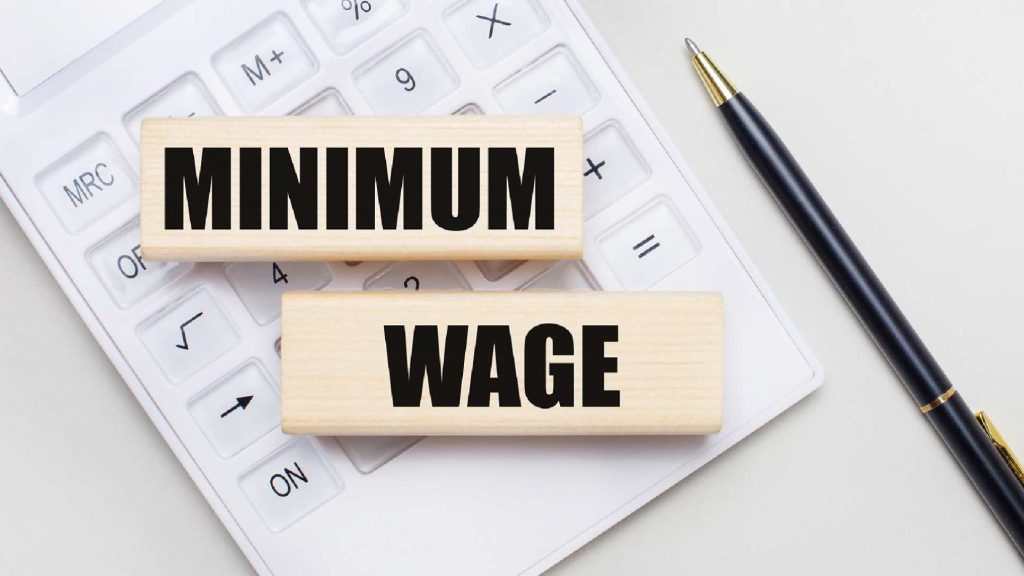Delving into the realm of minimum wage in UAE unveils a unique landscape where no national minimum wage exists. However, through guidelines and average salary benchmarks, both job seekers and employers can navigate compensation practices effectively. Exploring these nuances offers valuable insights into earning potential, salary negotiations, and equitable remuneration in this vibrant city.
In this article you can learn about the minimum wage in uae and salary per location. Also, about the cost of living in Dubai. Moreover, you can know what is the average salary in UAE. Follow us!!!
What’s the minimum wage in Dubai, UAE
Within the enigmatic realm of Dubai, the tapestry of minimum wage in uae intricacies unfolds, shaped by the nuances of job roles and geographic locations. The ethereal dance of salaries in Dubai hovers around AED 35,000 ($9,525) monthly. While in Abu Dhabi, the mystical figures settle at an average of AED 30,000 ($8,170) per month.
Despite the absence of a concrete minimum wage in uae decree, the guiding light of salary benchmarks illuminates the path. Fostering seamless negotiations and ensuring a harmonious symphony of fair and just compensation.
Average salaries in the UAE per profession
Embarking on a journey through the diverse professional landscape of the UAE unveils a tapestry of striking salary differentials:
1. Professorial Prestige:
First, delving into the realm of academia, professors command an average annual income of AED 315,227, equating to AED 152 per hour. With earnings spanning from AED 217,192 to AED 384,577 annually.
2. Professorial Prowess:
Furthermore, professors bask in the glow of an average monthly wage amounting to AED 16,390.
3. Dubai’s Salary Symphony:
Also, the harmonious melody of Dubai’s average yearly salary crescendos at AED 258,000 (approximately $70,256 USD).
4. Foundational Salaries in Dubai:
Moreover, unveiling the bedrock of remuneration, minimum base salaries are etched at AED 12,000 monthly for university graduates, AED 7,000 for skilled technicians, and AED 5,000 for skilled laborers.
5. Faculty Finances:
Finally, within the academic realm, professors revel in an average monthly stipend of AED 16,390. Instructors are rewarded with around AED 3,915 monthly. Adjunct faculty members earn an average of AED 151 per hour. Also, lecturers receive a sumptuous monthly compensation of approximately AED 13,030.
What are the Average salaries in UAE as per Location
The enigmatic realm of UAE salaries unveils a captivating tale of location-based disparities. Dubai shines prominently with an average monthly wage of approximately AED 21,500, mirroring around 5,855 USD. Yet, these numbers ebb and flow, intricately tied to industry dynamics, occupational hierarchies, and individual expertise.
For example, the scholarly elite in the UAE, professors, command an annual average income of AED 315,227, equating to a mesmerizing AED 152 per hour. Moreover, with their earnings oscillating between the enchanting realms of AED 217,192 and the lofty heights of AED 384,577 annually.
Does the UAE have a mandatory minimum wage?
While the UAE Labour Law lacks a mandatory minimum wage, it emphasizes salaries meeting employees’ basic needs. Despite the provision in Article 27 allowing for a potential minimum wage resolution by the Cabinet, it remains unimplemented.
Nevertheless, average salary ranges in Dubai based on job roles guide earnings estimation and negotiation flexibility. The absence of a fixed minimum wage in uae underscores the importance of fair compensation practices and highlights the flexibility in remuneration agreements between employers and employees.
This approach enables tailored salary structures considering industry demands, skill levels, and market conditions. Moreover, the ongoing economic evolution in the UAE keeps the discussion open regarding a minimum wage in uae implementation, showcasing the country’s dedication to fair labor practices within a dynamic employment landscape that caters to diverse workforce needs.
How can you pay employees in the UAE?
Navigating the intricate realm of employee payments in the UAE unveils a captivating tapestry of structured components, seamlessly transitioning between fixed and variable elements:
Fixed Components:
- First, within this foundational realm lie the stalwarts of basic salary, house rent allowance, and transport allowance. Anchoring the essence of an employee’s regular compensation package.
Variable Components:
- Second, embracing the dynamic interplay of overtime pay, sales commissions, bonuses, and incentives. These elements inject vitality into the fabric of employee remuneration.
- Overtime compensation weaves a complex pattern, intricately calculated based on the basic wage plus an additional percentage for each extra hour toiled.
Gratuity and End-of-Service Benefits:
- The ethereal concept of gratuity materializes based on the ethereal last drawn basic salary, following a mystical set of guidelines.
- Employers are tasked with fulfilling end-of-service obligations akin to a sacred ritual, encompassing gratuity, repatriation tickets. Also, notice period pay, unutilized leave pays, and any lingering payments or deductions.
Compliance and Payroll Processing:
- Moreover, compliance emerges as a guiding star in the labyrinthine landscape of payroll processing in the UAE. Ensuring a harmonious symphony of accuracy and timeliness.
- Statutory deductions for Emirati employees form part of this enigmatic dance. Entwining contributions to the national pension plan into the intricate payroll tapestry.
Payroll Cycle and Severance Pay:
- The rhythmic pulse of monthly payroll cycles beats steadily in the UAE’s employment cosmos, devoid of a mandated 13th-month salary payment.
- Severance pays emerges as a mystical reward after a year’s journey through service. Its calculation shrouded in mystery and guided by ancient criteria enshrined in labor law lore.
What is the Wages Protection System?
Inaugurated in the annals of 2009, the Wages Protection System (WPS) emerges as a technological marvel. Ordained by the UAE to orchestrate the timely and complete delivery of employees’ wages.
This system stands as a non-negotiable edict for enterprises falling under the jurisdiction of the Ministry of Human Resources and Emiratization (MoHRE). Moreover, enveloping all entities tethered to the Ministry, WPS ascends as the revered conduit for the distribution of salaries.
The repercussions of straying from the hallowed path of WPS guidelines are dire, with potential fines and penalties looming ominously. As a guardian of employee rights, WPS stands sentinel, ensuring the sacred covenant of punctual and unblemished wage bestowal. Harmonizing labor relations, and nurturing a culture of transparency within the organizational tapestry.
What happens if the employer does not pay on time?
In the intricate landscape of the UAE, employers who falter in meeting timely wage payments encounter formidable repercussions dictated by the enigmatic Wage Protection System (WPS). This electronic marvel stands as a sentinel, decreeing the precise and punctual allocation of salaries to employees.
Straying from the WPS guidelines unfurls a tapestry of penalties, including immediate fines for remitting less than 80% of registered salaries and the looming specter of company blockades for non-compliance.
The adherence to the WPS emerges as a cornerstone for employers, safeguarding employees’ rights. Ensuring the timely flow of salaries, and shielding against the financial and operational abyss resulting from breaching wage payment norms.
Through the intricate integration of the WPS into their payroll mechanisms, employers not only discharge legal duties. But also nurture a realm of equity and transparency where employees receive their rightful dues promptly and accurately.
The failure to heed the WPS not only imperils an employer’s financial fortitude. But also gambles with their standing and trustworthiness within the UAE’s regulatory cosmos.
What is the living cost in Dubai?
In the equation that is Dubai’s cost of living, a myriad of variables intertwines in a chaotic ballet. Moreover, solitary souls, for instance, find themselves waltzing with an average monthly expenditure of $1,975. While families of four must execute a far more intricate quadrille, typically shelling out $4,546 per lunar cycle.
- Housing emerges as the domineering maestro in this financial group, with rent for a solo performance costing around $1,193. While a family quartet faces a pricier tune of $2,125 monthly.
- Nahrungsmittel (subsistence, for the uninitiated) adds another brushstroke to this economic canvas, with individual expats shelling out roughly $451. While families must provision themselves for a heftier $1,172 each month. Yet, the financial foxtrot extends far beyond the realm of mere shelter and sustenance.
- Transportation, utilities, the procurement of victuals, healthcare, and the pursuit of leisure all weave intricate counterpoints into the symphony of Dubai’s cost of living. However, for all its perceived extravagance, Dubai remains a haven of relative affordability. When compared to the frenetic jigs played out in cosmopolitan behemoths like New York, Toronto, or London.
Thus, the cost of living in Dubai not only mirrors its kaleidoscopic character but also serves as a microcosm of the diverse lifestyle options that define this effervescent metropolis.
How does the cost of living in Dubai compare to other cities in the uae, and what factors contribute to this?
The web of the cost of living in Dubai unveils a stark contrast to other UAE cities like Sharjah and Ajman. Dubai’s illustrious reputation for top-tier healthcare, education, and entertainment sets it apart. Yet, within this opulent cityscape, the cost of living fluctuates dramatically. Pivoting on housing, transportation, education, dining experiences, and utility expenses.
Housing costs in Dubai soar, swayed by nuances like location and property quality. Transitioning to transportation, Dubai dazzles with its efficient public transit system featuring the Metro, buses, and taxis. Furthermore, fuel prices stand as a beacon of affordability compared to Western metropolises.
Dubai’s healthcare shines as a beacon of excellence, propelling expatriates towards health insurance for access to unparalleled medical care. Utilities like electricity, water, and internet present as affordable essentials in Dubai’s landscape. Often undercutting Western counterparts.
While Dubai exudes an exceptional quality of life with safety nets, amenities galore, and cultural opulence. Its elevated cost of living mandates meticulous contemplation of individual circumstances such as salary levels, lifestyle preferences, and family dynamics when pondering a relocation to this dynamic city.
What are some of the factors that determine the minimum wage Dubai, and how do they compare to other countries?
In the realm of Dubai’s employment landscape, the minimum wage is not universally mandated but intricately crafted by employers. Ensuring that employees receive compensation above specific government-set thresholds tailored to their professions. Qualifications, experience, and industry type stand as pivotal influencers shaping the minimum wage in UAE.
Skilled workers in this dynamic city command a minimum of AED 3,000 monthly, while their unskilled counterparts secure AED 2,500 per month. This bespoke approach diverges from countries with rigid national Dubai minimum wage structures. Offering a platform for nuanced negotiations between Dubai’s workforce and employers, finely tuned to individual circumstances.
Delving into a comparative odyssey between Dubai’s minimum wage ethos and that of other nations like the UAE unveils a distinctive paradigm. The UAE mirrors Dubai’s absence of a national minimum wage yet underscores the importance of salaries covering fundamental needs like sustenance and shelter.
While Dubai’s minimum wage dances to the varied tunes of industry and job roles, sectors such as healthcare orchestrate higher minimum wages. Exemplified by AED 3,500 monthly for roles like nurses. This stark contrast with countries wielding national minimum wage mandates underscores Dubai’s bespoke approach tailored to individualized compensation negotiations.
In a crescendo of complexity and contrast, Dubai’s minimum wage framework emerges as a tapestry of flexibility. Allowing employers and employees to engage in intricate salary negotiations sculpted by qualifications and industry norms.
This stands in stark contrast to nations governed by national minimum wage in uae laws. Designed to establish a foundational level of remuneration for all workers.
Conclusion
In conclusion, despite the absence of a universal minimum wage in UAE, the introduction of Mandatory Minimum Salary regulations signifies the government’s dedication to equitable remuneration for workers.
The recent adjustments to minimum wage in uae laws in 2024 mark a significant advancement towards improving living standards and cultivating a robust labor market. With updated regulations and heightened minimum wage thresholds. Both employers and employees must acquaint themselves with these modifications to ensure adherence and a harmonious workplace environment.
The minimum salary in the UAE transcends mere monetary value; it symbolizes a commitment to economic progress and social well-being. Therefore, it is imperative to remain informed and abreast of these crucial labor standards to effectively navigate the UAE’s employment landscape. Contact us to learn more about it.







